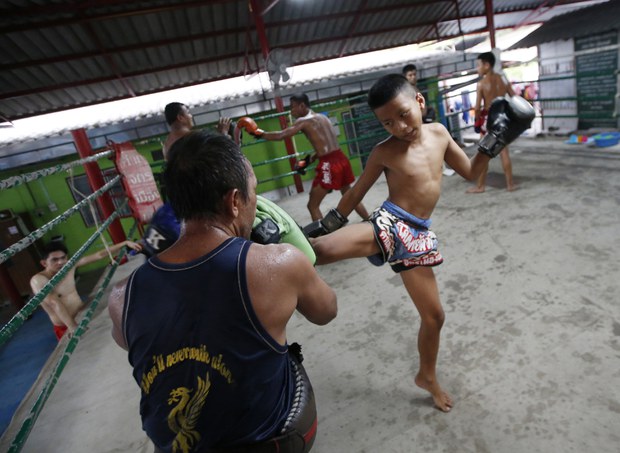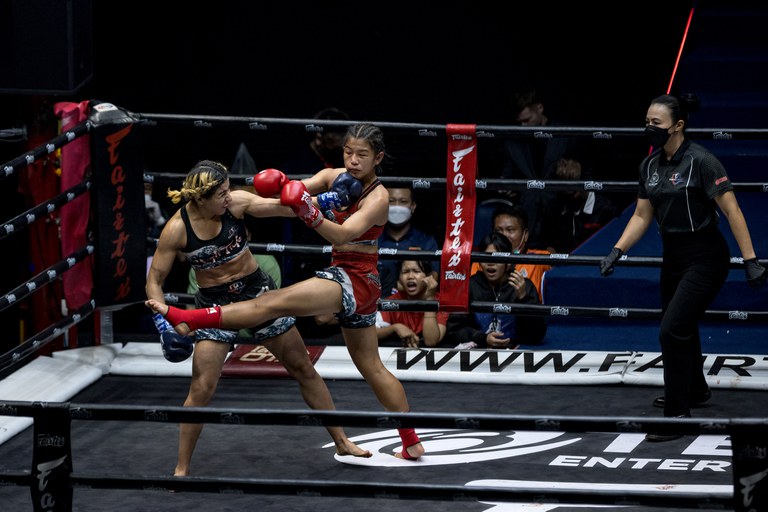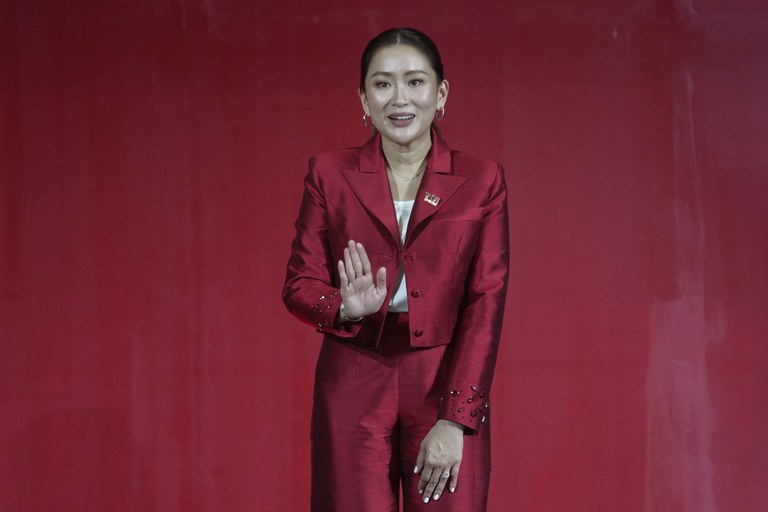From Muay Thai to movies, Thailand seeks to promote culture abroad in soft power drive
2024.01.30
Bangkok
 Thai boxer Chaichana Saengngern, 10 years old, practices kicks at training at camp Bangkok, Thailand, Wednesday, Nov. 14, 2018.
Thai boxer Chaichana Saengngern, 10 years old, practices kicks at training at camp Bangkok, Thailand, Wednesday, Nov. 14, 2018.
UPDATED at 3.14 a.m. ET on 2024-1-31
Chanchai Yomdit, a Muay Thai trainer and ex-kick boxer, is confident that Thailand’s national sport has international appeal and can be a magnet for tourists.
Many of his students have gone on to serve as ambassadors of Thai culture through their work as Muay Thai coaches abroad. He’s also aware of how foreign fans of the combat sport dream about coming to Thailand to train in the “Art of Eight Limbs,” as the discipline is also known.
“Muay Thai is a set of values. It’s a culture and a wisdom. There’s the training side to it [and] the way it is passed down and communicated,” Chanchai told BenarNews. “It is more than fighting; it is an influential culture.”
Thailand’s new government is hoping to seize on the popularity of the sport, as well as Thai food, arts and traditions from its unique heritage in a multimillion-dollar campaign to project its so-called soft power abroad.
The campaign launched by the government of Srettha Thavisin, which came to power in September, is part of a broader strategy to create a multitude of creative industry jobs and lure tourists – a key contributor to the economy – back to Thailand after it was hit hard during the COVID-19 pandemic.
To figure out how to promote everything from Muay Thai to the Thai-style version of pork shabu overseas, Srettha’s government has established a new body, the National Soft Power Strategy Committee, whose job is to execute this strategy.
“We aim to create a better economy,” Dr. Surapong Suebwonglee, a member of the committee, said during an interview with a local news outlet in November, when asked about the goal of the campaign.
“We are trying to change how to create a national revenue. We used to rely on foreign investment and exports but Thai people have been compensated so little. We want Thais to be highly-skilled and creative and to bring those skills and creativity to the world in order to create revenue for the country,” he said.

The campaign is trying to take a page out of the international playbook of South Korea, which is known the world over for such cultural exports as K-pop music, Korean barbecue, Korean neo-noir films and Taekwondo, among others.
“Today there are about 40,000 Thai boxing gyms worldwide. Thai boxing has expanded in the world organically, but it would be much better if we have a plan,” said Surapong, citing how the martial art of Taekwondo has been popular globally because of careful planning and support by the South Korean government throughout the decades.
According to Surapong, the campaign’s soft power name is a nod to Joseph Nye, the international relations theorist and Harvard University professor who first coined the term in 1990, just before the Cold War ended.
Nye’s 2004 book “Soft Power: The Means to Success in World Politics,” ignited a debate about how countries could gain influence and spread their values and power through strategic persuasion, as opposed to coercion.
Surapong said that the government preferred the term “soft power” over “creative economy” because it had a wider range of meanings.
Soft-power dreams
Chanchai, the Muay Tuay trainer, has visited South Korea to learn about how Taekwondo is officially managed by South Korea.
Bureaucracy at home has long been an obstacle to elevating Thai kick boxing’s status at an international level, he said.
In principle, the National Soft Power Strategy Committee was established to do away with red tape.
Helmed by Paetongtarn Shinawatra, the leader of the ruling Pheu Thai party, the government set up the body to improve laws and regulations and support soft-power initiatives, officials said.
The committee has asked for budget of 5.1 billion baht (U.S. $143 million) to spend in efforts to promote Thailand in 11 areas: Food, sports, festivals, tourism, music, literature, films, gaming, arts, design, and fashion.

Some of the recent initiatives include providing a budget for Thai film producers to take part in international film festivals; the elimination of censorship rules on Thai films to encourage creativity; a plan to issue a special 90-day visa for foreigners who want to attend a Thai boxing class in Thailand; a showcase of Thai books at international book fairs; and a budget to organize the nationwide Songkran Water Festival in April.
The policy’s broader aim is to create 20 million creative industry jobs by 2027, which would generate a minimum income of 4 trillion baht (U.S. $112 billion) annually, said Paetongtarn during the committee’s first meeting in October.
Thai chef Chumpol Jangprai, a committee member who helms a Michelin-star restaurant in Bangkok, said in December the government planned to train “a chef in every village,” starting with 10,000 in 2024 and another 75,000 over the following four years.
In the future, soft power initiatives will be governed by the Thailand Creative Content Agency, which will be set up to mirror the Korea Creative Content Agency, said Paetongtarn in November.
Art of subtle persuasion
Thai film critic Kong Rithdee applauded the government’s effort to support culture and the creative industries.
“It is a good sign. These things take time and commitment before they reach fruition. It doesn’t matter if the policy is called soft power, creative economy or cultural export, the thrust of it is to support those in the cultural sector,” he said.
Despite the government’s lofty intentions, other observers have offered a more cautious assessment of the plan.
“The budget of 5.1 billion baht is only a minor sum. If you want an international-level outcome, you cannot invest on a national-level scale,” said Thamrongsak Petchlertanan, an associate professor of political science at Rangsit University in Pathum Thani.
“If you look at how South Korea’s K-Pop [industry] has been built, it requires heavy and continuous investment.”
Thamrongsak doubted the campaign would have much impact globally, but “it could affect the domestic market, which also means the popularity of the Pheu Thai-led government.”

Mark S. Cogan, an associate professor of Peace and Conflict Studies at Japan’s Kansai Gaidai University, said the committee being run by Paetongtarn was a vehicle for her to “burnish her credentials ahead of a potential move toward a Cabinet position or a later bid for higher office.”
But he said soft power worked best when it was quiet, not loud.
“Soft power is often subtle and grows not necessarily because of something a government does, but through the values and culture of its people,” he said. “[It is] the ability to attract based on the legitimacy of one’s own values. So no one would go around saying, ‘Hey, look how attractive we are!’”
“Muay Thai is obviously attractive, and it should be promoted, but saying it should be promoted as soft power is awkward. All you have to do is promote it. That’s it.”
This story was updated to correct the title of Dr Surapong Suebwonglee, who is a committee member but no longer deputy prime minister. An earlier version said the committee had been given a 5.1 billion baht budget. It has requested the sum, but it has not yet been approved.







